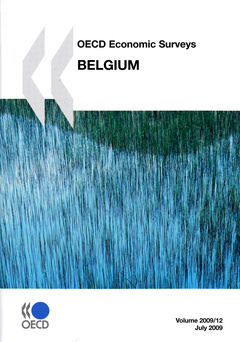Belgium 2009: OECD Economic surveys Coll. ECONOMIE
Langue : Français

This 2009 edition of OECD's periodic survey of Belgium explores how Belgium should cope with the economic crisis and includes chapters on securing fiscal sustainability, improving fiscal federalism, reforming the tax system, and promoting competition.
Chapter 1. Coping with the Crisis while Pursuing Structural Reforms. Belgium has plunged into a severe crisis. -Policies promptly reacted to sustain the economy. Improving potential growth depends on structural reforms. -Challenges facing the Belgian economy. Progress in Structural Reform. Chapter 2. Securing Fiscal Sustainability during the Economic Downturn and Beyond. The current strategy toward fiscal sustainability needs to be revised. Short-term fiscal measures should not be detrimental to long-term security. Postponing fiscal consolidation will shift the ageing cost burden to younger generations. Restoring a credible path towards sustainability requires better expenditure control and institutional reforms. Chapter 3. Improving Fiscal Federalism. Despite decentralisation, the bulk of the deficit reduction has been achieved by the federal budget. Spending pressure from demographic change will mainly afffect the federal government budget. Sub-federal governments spend almost 40% of total government expenditure. Despite increased taxing power of regions, their revenues continue to be dominated by transfers from the federal government. Transfers from the federal government are not aligned with revenue collection or spending needs. Equalisation transfers penalise economic efforts. Improving coherence of policies of sub-federal governments in areas of national interest. Main Historical Steps of Belgium's Federalism. Chapter 4. How to Reform the Tax System to Enhance Economic Growth. The tax system relies heavily on labour taxes. The high taxes on labor have a negative effect on labour supply. The corporate income tax system has become more neutral vis-a-vis types of financing. The tax treatment of savings vehicles varies considerably. The reliance on consumption taxes is relatively low. Chapter 5. Promoting Competition to Strengthen Economic Growth. More competition to benefit productivity, employment and consumer welfare. The Competition Authority needs further strengthening. Competition in retail distribution is burdened by heavy regulation. Regulators in network industries are faced with dominant positions of incumbents. Conclusion.
Thème de Belgium 2009: OECD Economic surveys :
© 2024 LAVOISIER S.A.S.



